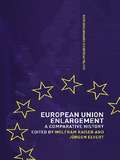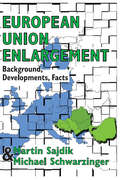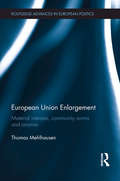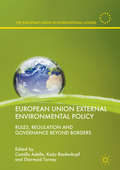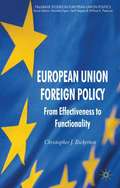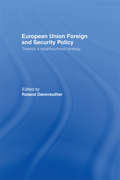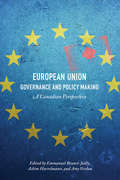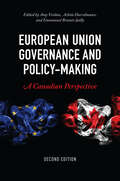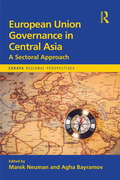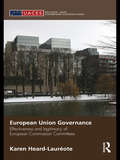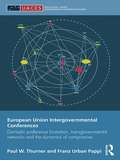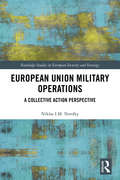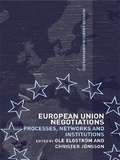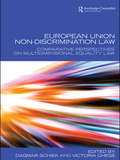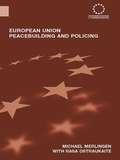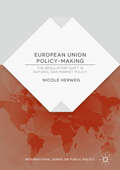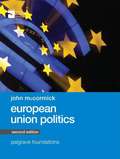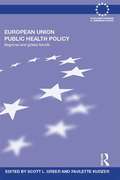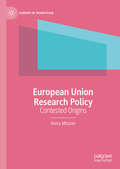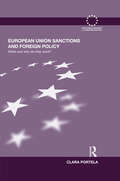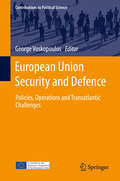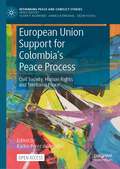- Table View
- List View
European Union Enlargement: A Comparative History (Routledge Advances in European Politics #Vol. 18)
by Wolfram Kaiser Jürgen ElvertEuropean Union Enlargement provides a comparative analysis of the post-war European policies of those states that joined the European Union between 1973 and 1995.The volume draws upon new empirical research in order to investigate the policies that these 'newcomer' states have had towards Europe since 1945, with an emphasis on their experience of membership and its possible Europeanising effect. A final comparative chapter draws the national European policies of the 'newcomers' together and outlines what they have brought to the EU. The book also tests integration theories against the available evidence, demonstrating their limited explanatory value and the economic, political and cultural specificity of different national paths towards EU integration.
European Union Enlargement: Background, Developments, Facts
by Michael SchwarzingerEuropean Union Enlargement offers an intense and detailed analysis of the almost ten-year process of preparing and negotiating the accession of Eastern, Southeastern, and Central European countries, as well as Mediterranean countries to the European Union. In the end, ten joined in 2004, with two more to follow in 2007. European Union Enlargement was written by two diplomats who were directly involved in that process.Sajdik and Schwarzinger relate their first-hand experience of proceedings that occurred behind closed doors. They detail how the vision of adding some countries gradually developed into the concrete policy intended to enlarge the European Union. A special chapter explains the Accession Process as well as the Union's strategy that prepared the candidate countries, in legal and economic terms, for membership.The authors describe in detail the complex negotiations that occurred from 1998 to 2002. These include activities of EU member states as well as the European Commission with respect to the candidate countries. They further offer a brief analysis of future possibilities of EU-accession by Balkan nations and Turkey. A number of topical chapters deal with particular key issues involved in the process: free movement of workers, agriculture, financing of the enlargement, transport, and nuclear safety. Other chapters deal with the enclave of Kaliningrad as well as the Stability and Association Pact for South East Europe.In addition to providing key information about the process, this volume is also a case study of European policies and diplomatic practice. The enlargement negotiations from 1998 to 2002 were the most complex ones the European Union had ever conducted. In consequence, this work gives insight into the working methods of both the institutions in Brussels and of the representatives of the member states that made them a success. It will be of interest to those concerned with European politics, international organizations, and area studies.
European Union Enlargement: Material interests, community norms and anomie (Routledge Advances in European Politics)
by Thomas MehlhausenThe continuous expansion of the European Union has transformed its very own self-conception. While Eastern enlargement was widely celebrated as the ‘reuniting of Europe’, the sheer number of applicants, their low economic development and the need for new states to transform in accordance with EU values required considerable adjustments to the EU’s self-image. By examining the European Council’s contentious approval of the Mediterranean and Central and Eastern European countries in the 1970s and 1990s, this book investigates why the European Union enlarges. Based on new and hitherto not analysed data, it introduces the concept of ‘anomie’ to the discourse and, in doing so, makes a timely contribution to the literature of constitutional politics and enlargement of the European Union. This text will be of key interest to scholars and students of the European Union, area studies (European studies, central and east European studies, Mediterranean studies) and more broadly comparative politics and constitutional politics.
European Union External Environmental Policy
by Camilla Adelle Katja Biedenkopf Diarmuid TorneyThis book considers the environmental policies that the EU employs outside its borders. Using a systematic and coherent approach to cover a range of EU activities, environmental issues, and geographical areas, it charts the EU's attempts to shape environmental governance beyond its borders. Key questions addressed include: What environmental norms, rules and policies does the EU seek to promote outside its territory? What types of activities does the EU engage in to pursue these objectives? How successful is the EU in achieving its external environmental policy objectives? What factors explain the degree to which the EU attains its goals? The book will be of interest to students and academics as well as practitioners in governments (both inside and outside of the EU), the EU institutions, think tanks, and research institutes.
European Union Foreign Policy
by Christopher J. BickertonScholars and policymakers in EU foreign policy lament the EU's inability to assert itself on the world stage. This book explains this weakness by arguing that EU foreign policy is burdened by various internal functions, and systemizes the analysis of internal functionality, pushing the study beyond the concern with effectiveness.
European Union Foreign and Security Policy: Towards a Neighbourhood Strategy
by Roland DannreutherThe end of the Cold War presented a major challenge to Western Europe and to the European Union. It led not only to a whole new set of countries seeking to join the EU, but also to a strong demand for a more intensive EU engagement in the broader regional context. This book assesses whether the EU has successfully faced up to this challenge and has adapted its policies towards its immediate neighbourhood in a coherent and strategic manner. This volume examines EU policy from all its major regional dimensions including assessments of:* the enlargement process to East Central Europe* the increasing engagement of the EU in conflict resolution, most notably in the Balkans, but also in the Arab-Israeli conflict* policies towards the countries of the former Soviet Union, such as Russia, Ukraine and the Caucasus* the complexities of EU policy towards Turkey and the Middle East* the transatlantic dimensions of the EU's neighbourhood policies.
European Union Governance and Policy Making: A Canadian Perspective (G - Reference, Information and Interdisciplinary Subjects)
by Amy Verdun Emmanuel Brunet-Jailly Achim HurrelmannEuropean Union Governance and Policy Making introduces Canadian students to the politics of the EU. Divided into three parts, the collection examines its political system (history, theories, institutions), specific policies, and some of the challenges that the EU currently faces. Geared toward students who are learning about the EU in Canadian classrooms, the text integrates Canadian content and examples to demonstrate how Canada compares to the EU. It discusses current issues such as the refugee crisis and the rise of populism, Brexit, and plans for deepening European integration in the wake of the Euro Area financial crisis. The introduction defines core themes and each chapter returns to these themes, creating structure and coherence.
European Union Governance and Policy-Making, Second Edition: A Canadian Perspective
by Amy Verdun Emmanuel Brunet-Jailly Achim HurrelmannEuropean Union Governance and Policy-Making introduces the politics of the European Union (EU) to a student audience. The book is explicitly written for students enrolled in universities in Canada, or other non-EU countries, and builds on their academic background. Chapters cover the political and legal system of the EU, theories of European integration, core EU policies such as the Single Market, its single currency, migration policy, EU enlargement, as well as pressing issues facing the further development of European integration. This second edition has been comprehensively revised and updated to include a discussion of Brexit, the European Green Deal, COVID-19, and the Russian invasion of Ukraine. Written by leading Canadian scholars in the field of European integration, as well as international experts with teaching experience in Canadian universities, this textbook leverages the comparison to Canada and its federal system to help students understand what is unique about the European Union.
European Union Governance in Central Asia: A Sectoral Approach (Europa Regional Perspectives)
by Marek NeumanThe edited volume attempts to critically approach EU-Central Asian relations, asking whether – when adopting a more sectoral governance approach – the EU’s transformative power vis-à-vis the region is greater than initially argued and if so, under what conditions it flourishes most. It assesses whether, through adopting a sectoral approach to the area of, development, infrastructure, water management, security, climate change, energy, trade, health, education, or any other element defining EU-Central Asian relations, the European Union is able to (co-)shape this geopolitically strategic region. If so, what drives the EU’s ability to do so; if not, what mitigates its (potential) influence? This book contributes to the scholarship on the EU’s external governance both empirically and theoretically.
European Union Governance: Effectiveness and Legitimacy in European Commission Committees (Routledge/UACES Contemporary European Studies)
by Karen Heard-LaureoteThe European Commission has increasingly focused on the benefits it can derive from the greater participation of organized civil society in its role and activities. In the face of general decline in public trust in the institutions of government, it facilitated and encouraged new channels of access and consultation opportunities as a means to legitimize its position within the European political system. Karen Heard-Lauréote’s comparative analysis of four European Commission advisory forums innovatively investigates the existence of a conflict between the capacities of such forums to deliver standards of good governance. The author questions whether these venues can provide efficiency gains via the production of sufficient policy output without delays or deadlocks at reasonable cost and sustain adequate democratic credentials such as legitimacy. This study makes a significant contribution to its field by pursuing contemporary legitimacy debates asking whether under certain conditions or in certain policy-making contexts, legitimacy and efficiency may be reconciled or become at least partially compatible in European Commission committees. European Union Governance will be of interest to students and researchers of European Union politics and policy-making.
European Union Intergovernmental Conferences: Domestic preference formation, transgovernmental networks and the dynamics of compromise (Routledge/UACES Contemporary European Studies)
by Paul W. Thurner Franz Urban PappiThis book provides a detailed examination of the complex negotiation processes surrounding intergovernmental conferences in the European Union. Since the Treaty of Amsterdam (1997) and its ‘appendix’, the Treaty of Nice in 2002, any reform of the treaty framework of the European Union seems to be doomed to fail, evidenced by the decline of the Constitutional Treaty and by the current fate of the Lisbon treaty. By presenting an extensive quantitative study of the Intergovernmental Conference of 1996/7 prior to the Treaty of Amsterdam, the authors argue that these negotiations reveal the major challenges of European integration. Drawing on advanced statistical methods, they contend that multi-level negotiations require an appropriate coordination of informal administrative networks and the empowerment of administrative leadership, with these factors significantly shaping the dynamics and outcomes of negotiations. Through these findings, this book lays down the foundation for future evidence-based evaluations of negotiations and implementation studies, and delivers new insights on decision-making within the European Union. European Union Intergovernmental Conferences will be of interest to students and researchers of political science, sociology, administrative science, business and management studies, international law and European law.
European Union Internal Market Law
by Friedl Weiss Clemens KaupaThis is the market's most student-friendly textbook on EU internal market law, covering everything students need to know about the legal and regulatory framework of the internal market and eliminating the need for a full EU law text. Concise and focused, chapters explore the underlying socio-economic and historical contexts of EU law, and offer a thorough examination of the law's technical aspects, ensuring that students gain a rich understanding of the way that legal rules and structures have developed from key political and social debates. Key concepts are illustrated by excerpts, summaries and discussions of classic and modern cases. Numerous features include text boxes, illustrative cases, legal interpretations, tables, and suggestions for further reading, which support students with little background knowledge of the subject, leading them to total mastery of the material.
European Union Law
by Gareth Davies Damian Chalmers Giorgio Monti Damian Chalmers Gareth DaviesAdvocacy organizations are viewed as actors motivated primarily by principled beliefs. This volume outlines a new agenda for the study of advocacy organizations, proposing a model of NGOs as collective actors that seek to fulfil normative concerns and instrumental incentives, face collective action problems, and compete as well as collaborate with other advocacy actors. The analogy of the firm is a useful way of studying advocacy actors because individuals, via advocacy NGOs, make choices which are analytically similar to those that shareholders make in the context of firms. The authors view advocacy NGOs as special types of firms that make strategic choices in policy markets which, along with creating public goods, support organizational survival, visibility, and growth. Advocacy NGOs' strategy can therefore be understood as a response to opportunities to supply distinct advocacy products to well-defined constituencies, as well as a response to normative or principled concerns.
European Union Law
by Gareth Davies Damian Chalmers Giorgio Monti Damian Chalmers Gareth DaviesThis eagerly awaited new edition has been significantly revised after extensive user feedback to meet current teaching requirements. The first major textbook to be published since the rejuvenation of the Lisbon Treaty, it retains the best elements of the first edition - the engaging, easily understandable writing style, extracts from a variety of sources showing the creation, interpretation and application of the law and comprehensive coverage. In addition it has separate chapters on EU law in national courts, governance and external relations reflecting the new directions in which the field is moving. The examination of the free movement of goods and competition law has been restructured. Chapter introductions clearly set out what will be covered in each section allowing students to approach complex material with confidence and detailed further reading sections encourage further study. Put simply, it is required reading for all serious students of EU law.
European Union Military Operations: A Collective Action Perspective (Routledge Studies in European Security and Strategy)
by Niklas I. NovákyThis book offers an in-depth study on the deployment of military operations in the framework of the European Union’s Common Security and Defence Policy (ESDP/CSDP). While existing studies of the subject are either descriptive or focused on a single level of analysis, this book incorporates factors from three different levels of analysis to explain the deployment of ESDP military operations. First, the international level, where the emergence of events that threaten certain values held dear by EU member states, catalyses the process leading to an operation; second, the national level, where the member states formulate their initial national preferences towards a prospective deployment based on national utility expectations; and third, the EU level, where the member states come to negotiate and seek compromises to accommodate their different national preferences towards a deployment. The strength of this multi-level collective action approach is demonstrated by four in-depth military case studies, which analyse the preference formation of France, Germany, and the UK towards the deployments of Operation Althea in Bosnia and Herzegovina, Operation Artemis and EUFOR RD Congo in the Democratic Republic of the Congo (DRC), and Operation Atalanta off the coast of Somalia, respectively. The author draws on a wealth of primary sources, including over 50 semi-structured interviews conducted with national and EU officials during 2011-15, and provides an up-to-date overview and critique of the existing theoretical literature on the deployment of ESDP/CSDP military operations. This book will be of much interest to students of European security, EU politics, military and strategic studies, and International Relations in general.
European Union Negotiations: Processes, Networks and Institutions (Routledge Advances in European Politics)
by Christer Jönsson Ole ElgströmThe EU policy process is dependent on negotiations as a mode of reaching agreements on, and implementing, common policies. The EU negotiations differ from traditional international negotiations in several respects and this book presents a detailed analysis of the processes while examining their distinguishing features.The authors explore the variety of negotiation processes, the continuity and institutionalization of negotiation processes as well as the involvement of a variety of actors besides governments, often linked in informal networks. Going beyond the common distinctions based on issue-areas or the EU as negotiation arena as opposed to negotiating actor externally, the authors explore the impact of different stages in the policy process and the nature of the external negotiating partner.
European Union Non-Discrimination Law: Comparative Perspectives on Multidimensional Equality Law
by Dagmar Schiek Victoria ChegeEU equality law is multidimensional in being based on different rationales and concepts. Consequently, the concept of discrimination has become fragmented, with different instruments envisaging different scopes of protection. This raises questions as to the ability of EU law to address the situation of persons excluded on a number of grounds. This edited collection addresses the increasing complexity of European Equality Law from jurisprudential, sociological and political science perspectives. Internationally renowned researchers from Scandinavian, Continental and Central European countries and Britain analyse consequences of multiplying discrimination grounds within EU equality law, considering its multidimensionality and intersectionality. The contributors to the volume theorise the move from formal to substantive equality law and its interrelation to new forms of governance, demonstrating the specific combination of non-discrimination law with welfare state models which reveal the global implications of the European Union. The book will be of interest to academics and policy makers all over the world, in particular to those researching and studying law, political sciences and sociology with an interest in human rights, non discrimination law, contract and employment law or European studies.
European Union Peacebuilding and Policing: Governance and the European Security and Defence Policy (Routledge Advances in European Politics #Vol. 40)
by Michael Merlingen Rasa OstrauskaiteThis new book provides an in-depth analysis of the projects of improvement carried out by the civilian peacebuilding missions in Bosnia and Macedonia, drawing on the work of Michel Foucault to make the case that the EU’s (self-) image as a model peacebuilder conceals another side of the European Security and Defence Policy. The authors explore the double-sided nature of peacebuilding missions, on the one hand, as a way to pacify, democratize, humanize and improve life in societies emerging from crisis or violence and, on the other hand, as a kind of political pastorate that limits the range of acceptable heterogeneity by refashioning, repositioning and reorganizing subjects in line with transcendentalized notions of good governance. The authors develop a limited reform agenda for how EU police missions can fold an agonistic generosity more deeply into their civilizing ethos in order to ensure they have a light expatriate footprint in their host countries. The prescriptive part of the book also discusses generic problems in the implementation of EU police reforms and suggests ways to overcome these challenges. This book will be of great interest to students of European politics, sociology, political science and theory.
European Union Policy-Making
by Nicole HerwegThis book furthers the ongoing theoretical development of the multiple streams framework, assessing its applicability to European Union (EU) policy-making processes. It systematically defines and identifies functional equivalents for all of the framework's core concepts at the EU level and extends the framework in order to explain agenda-setting and decision-making. Furthermore, the book derives a set of explicit hypotheses to empirically assess the extent to which the (modified) framework is able to explain timing, agenda prominence, and policy change (or a lack thereof) for the EU natural gas directives passed in 1998, 2003, and 2009. The analysis documents that the framework is well-suited to explain the EU policy process in general and reveals where additional theoretical refinements are required.
European Union Politics (Palgrave Foundations Series)
by John McCormickEuropean Union Politics provides an authoritative introduction to all aspects of politics and policy in the EU. It gives readers a sense of the colour and flavour of EU politics, while systematic coverage of different theoretical perspectives encourages a more sophisticated understanding of how and why the EU has become what it is today.
European Union Public Health Policy: Regional and global trends (Routledge Advances in European Politics)
by Scott L. Greer Paulette KurzerRanging from influence over world trade laws affecting health to population health issues such as obesity to the use of comparative data to affect policy, the EU’s public health policies are increasingly important, visible, expensive and effective. They also provide an invaluable case study for those who want to understand the growth and impact of the EU as well as how states can affect their populations’ lives and health. European Union Public Health Policy capitalizes on extensive new research, providing an introduction to the topic and indicating new intellectual directions surrounding the topic. An introductory section and extended conclusion explore the meaning of public health, the relationship of EU public health policy to health care policy, and the place of public health in the study of European integration and Europeanization. Focusing on health system transformation, global health governance and population health, the chapters address: Relevant policy issues and EU policies; Effects of the EU policies on practice or outcomes; An explanation of the policy trajectory; Current issues and likely future directions or conflicts. Drawing together an international and multidisciplinary selection of experts, this volume is an important contribution for all those interested in public health policy, EU health policy and EU governance.
European Union Research Policy: Contested Origins (Europe in Transition: The NYU European Studies Series)
by Veera MitznerThis book describes the emergence of research policy as a key competence of the European Union (EU). It shows how the European Community (EC, the predecessor of the EU), which initially had very limited legal competence in the field, progressively developed a solid policy framework presenting science and research as indispensable tools for European economic competitiveness and growth. In the late 20th century Western Europe, hungry for growth, concerned about the American technological lead, and keen to compete in the increasingly open international markets, the argument for a joint European effort in science and technology seemed plausible. However, the EC was building its new functions in an already crowded field of European research collaboration and in a shifting political context marked by austerity, national rivalries, new societal and environmental challenges, and emerging ambivalence about science. This book conveys the contested history of one of the EU’s most successful policies. It is a story of struggle and frustration but also of a great institutional and intellectual continuity. The ideational edifice for the EC/EU research policy that was put in place during the 1960s and 1970s years proved remarkably robust. Its durability enabled the rapid takeoff of the European Commission’s initiatives in the more favorable political atmosphere of the early 1980s and the subsequent expansion of the EU research funding instruments and programs that permanently transformed the European research landscape.
European Union Sanctions and Foreign Policy: When and Why do they Work? (Routledge Advances in European Politics)
by Clara PortelaWinner of the THESEUS promising award for Research on European Integration 2011. Sanctions are an important tool within the foreign policy of the European Union, which have until now remained obscure to both scholars and the general public. This book examines sanctions as a political tool of influence and evaluates the efficacy of sanctions imposed by the EU against third countries and their ability to bring about the desired outcome. While the principal sanctions activity of the EU takes place under the Common Foreign and Security Policy, the author also considers the suspension of development aid under the ACP-EU Partnership Agreement, the withdrawal of trade privileges under the Generalized System of Preferences and other sanctions outside these frameworks. Reviewing the sanctions practice of the EU in its virtual entirety, Portela assesses the relevance of classical sanctions theory by testing a series of hypotheses with empirical case-studies attempting to identify the determinants of success of EU sanctions. Enhancing our understanding of the EU's international role, this book will be of interest to students and scholars of international politics, security studies, EU studies, human rights and democracy, conflict management, IPE and development studies.
European Union Security and Defence: Policies, Operations and Transatlantic Challenges (Contributions to Political Science)
by George VoskopoulosThis book explores the multilayer nexus among inter-related international and regional security parameters that critically define the EU’s rapidly changing security environment. In terms of intensity, complexity and urgency these changes constitute challenges that threaten the very core of European security – both internal and external. In a fluid and transitional international environment of diversified needs and polymorphic threats the space dimension acquires a novel unified meaning.The book closely examines the EU’s current strategic, organisational and defence capabilities regarding global, regional and domestic challenges such as terrorism, systemic instability, global order and a number of crucial hindrances to transatlantic cooperation. The chapters offer not only valuable theoretical insights, but also unique perspectives on operational and organisational elements of EU applied policies based on the testimonies of field experts. The combination of theory-based approaches and the demonstration of the EU’s operational capabilities and weaknesses as externalized through its global strategy choices provide an overall evaluation of adopted policies and their effects. This is crucial in a global transition period that will define the EU’s role and its potential to produce desired outcomes through synergies with its strategic allies.
European Union Support for Colombia's Peace Process: Civil Society, Human Rights and Territorial Peace (Rethinking Peace and Conflict Studies)
by Karlos Pérez de ArmiñoThis open access book provides a comprehensive analysis of the EU's crucial support for the implementation of the Havana Peace Agreement between the Colombian government and the FARC-EP. It explores the use of new approaches and instruments that, despite some limitations and criticisms, could go beyond conventional liberal peace and provide useful lessons. Particular attention is paid to three axes: strengthening civil society, protection of human rights and a territorial peace perspective, as a contribution to the "local turn" in peace policies. The book first outlines the background of the conflict, the EU's two-decade defense of a negotiated peace, and the complexities of the peace process. Then, it analyses the development cooperation and political support provided in different areas: the collective reinsertion of ex-guerrillas, women and gender initiatives, the rights of ethnic communities, the sophisticated transitional justice system, as well as activities on reconciliation, victims and protection of human rights defenders.
